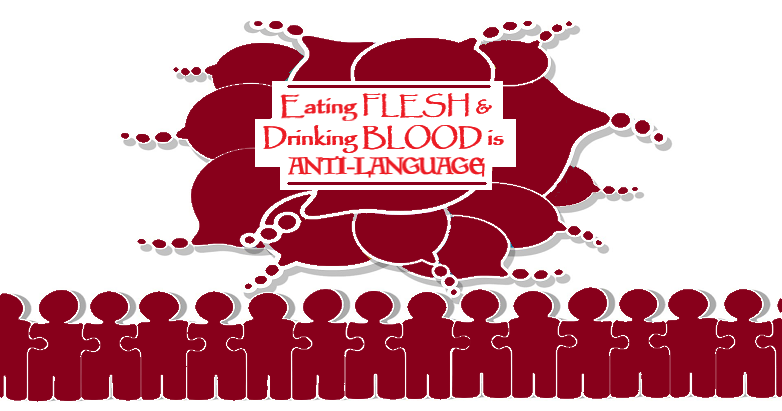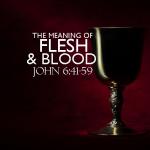
Let’s break down what eating flesh and drinking blood would have meant to first-century Israelites.
This Sunday, the Gospel is John 6:41-51. Just like last time, today, we continue discussing Jesus, insisting to his audience that they must “eat his flesh and drink his blood” (John 6:51-58). What is eating flesh and drinking blood really?
Learn more about Jesus’ insisting on eating flesh and drinking blood here—
Eating Flesh and Drinking Blood Oversimplified
Many Catholics respond that the meaning is clear and simple: Jesus was talking about the Eucharist. But this answer is oversimplified for several reasons. One reason being that “John” wrote for an antisociety in its own anti-language.
According to Context Scholar Bruce Malina and Jerome Neyrey, the Johannine antisociety was a conscious alternative group to the dominant society of first-century Israel. It was an alternate society made up of Israelite outcasts, social deviants, and misfits. Severe marginalization and social conflict forced the Johannine community in ways unlike the other New Testament Jesus groups. It became an antisociety, a social bubble inside within but resistant towards the dominant social order.
As Malina explains, societies share language, but antisocieties share anti-language. Anti-language gets developed precisely to keep outsiders out. It prevents outsiders from understanding the antisocial group. If you think learning Greek will help you understand the Gospel of “John,” think again! More is needed. The anonymous author we call “John” did not write in Greek. Instead, “John” wrote in Johannine anti-language.
Israelite Understandings of Eating Flesh and Drinking Blood
But before we get to what “eating flesh and drinking blood” meant in Johannine anti-language, what could this curious expression mean to a first-century Israelite audience? What would it mean to Israelites in the 20s CE? And what would it mean to Israelites in the 90s CE, when the anti-language version of “John” came to be?
You can’t understand what “John” or any other book in the Bible means until you understand what it meant. To understand what “eating flesh and drinking blood” meant, you first need to grasp two different social contexts taken from the dominant society of first-century Israel.
Eating Flesh and Drinking Blood: Cannibalism?
First, “eating flesh and drinking blood” would mean something abhorrent—cannibalism. This is because one meaning of “flesh and blood” meant human creatures (Galatians 1:16; Hebrews 2:14). Why? It is because humans are mortal.
Of course, “flesh” was the soft parts of a human (or animal’s) anatomy consisting of muscle and fat, all filled with blood. Biblically, humans consist of flesh and bone, the rigid frame on which the soft, bloody part adheres (Genesis 2:23; 29:14). At death, the flesh rots quickly, and only bones remain. “All flesh is grass,” says Deutero-Isaiah and “Peter” (see Isaiah 40:6 and 1 Peter 1:16). The analogy is all human beings (i.e., “flesh and blood”) are ephemeral, transitory, and weak. By extension, one meaning of “eating flesh and drinking blood” would be cannibalism.
This is because “flesh and blood” meant being human. It meant being created, bodily, and mortal. It meant perishable. We see this understanding in Paul, who wrote, “flesh and blood cannot inherit the kingdom of God, nor does the perishable inherit the imperishable” (1 Corinthians 15:50).
By the way, Paul was an Israelite who, unlike “John,” did not write in anti-language. If Paul had ever gotten the chance to pick up the anti-language Gospel called “John” (completed decades after Paul died) and read it, he would think he was reading Greek. Ultimately, Paul wouldn’t understand it. Just like Ignatius of Antioch and Irenaeus of Lyon wouldn’t either. Not a chance!
Eating Human Beings
So in one sense, “flesh and blood” meant human creature. Whether friendly or hostile, humans are “flesh and blood.” And like Adam, humans were thought to be made from mud. Don’t we return to dirt at death? Human creatures, flesh and blood equaling mud, are unlike the immortal sky-vault beings made of flame and wind.
In contrast to humans, spirits are the “principalities, powers, world rulers, and other wicked spirit warriors” (Ephesians 6:12). But also among these fiery-wind beings are the sky servants of God’s fancy entourage above. And the most honorable of these is the Son of Man or Lamb of God, a constellation we call Aries, the Ram. Indeed, the life of the celestial Sky-Vault Man is not that of flesh and blood that equals mud!
Therefore, “flesh and blood” meant mortal human creatures. And hence, “eating flesh and drinking blood” meant cannibalism. Ultimately, this is one first-century Israelite meaning.
Eating Flesh and Drinking Blood is Forbidden!
The second meaning is relative to animals. In this sense, “eating flesh and drinking blood” distinguishes what is edible by humans. For Israelites, the only edible animal meat derives exclusively from that offered in the temple sacrifice.
But even of those edible animals, two parts belonged to God, verboten to Israelite consumption—the blood and the fat surrounding the kidneys. In fact, according to Israelite tradition, no human beings, not even Gentiles, were permitted to ingest blood (Genesis 9:4). That rule went double for Israelites (Deuteronomy 12:23; Leviticus 17:11, 14; 19:26).
But also Israelites were forbidden from eating the other source of life, fat (Leviticus 3:16). Specifically, this was the fat surrounding the kidneys of a sacrificed animal. Ancients associated this kidney fat as the seat of life because of the way it anatomically connected with the sexual organs (Psalm 139:13—literally, “you possessed my kidneys”). They saw life came from this blood and kidney fat. Because Israelites believed that life comes from and belongs to God exclusively, it followed that there would be prohibitions against ingesting blood and kidney fat.
Confused By Eating Flesh and Drinking Blood
So when the Johannine Jesus insists on “eating flesh and drinking blood,” namely his, his listeners would have both these meanings on their minds. Was he talking about eating a mortal human creature, cannibalism? Or was he speaking about the blood and kidney fat of a sacrificed animal? The reaction was violent confusion and disagreement. In other words, they didn’t get the anti-language.
Anyone reading “John,” not part of the Johannine antisociety, wouldn’t get the anti-language either. They would believe that they are reading common Israelite understandings in ordinary Greek. Therefore, they would imagine that Jesus is telling them to consume prohibited foods God forbade since the days of Noah. Worse, they would probably understand Jesus was insisting on cannibalism.
But remember this is Johannine anti-language, and John 6 is like every other part of “John.” Recall that anti-language overlexicalizes. In other words, it has too many different words and expressions meaning the same thing. Therefore, “eating flesh and drinking blood” is just another Johannine way of repeating something learned in John 1:1-18.
Insiders Got Eating Flesh and Drinking Blood
For Johannine insiders, it was a laugh riot when they read about outsiders becoming appalled! Those evil people in darkness will never understand! Good! That’s the way it should be! They think it’s a horror show. Those idiots!—Ha! Remember, antisocieties don’t want to be understood by the dominant society that rejected them. To hell with first-century Israel, thought the Johannine insiders!
But 21st-century Catholics are not exactly Johannine insiders either. When we read about Jesus telling his Israelite audience about “eating flesh and drinking blood,” we re-contextualize. We imagine Jesus is telling us about the Eucharist and our Eucharistic doctrines and devotions.
Hence, we conflate John 6 with Matthew 26:26-29; Mark 14:22-25; Luke 22:15-20; and 1 Corinthians 10:16; 11:23-27, even though “body” and “flesh” are not the same according to ancient Israelite understanding. So is our conflation of these verses legitimate? We will return to this question in a later post.
Outsiders VS Insiders: Eating Flesh and Drinking Blood
Israelite outsiders to the Johannine group were blind in their darkness. Stupidly, they imagined that Jesus insisted that Israelites should break God’s food sanctions and engage in cannibalism.
In contrast, enlightened Johannine community insiders realized that eating flesh and drinking blood (of Jesus) was different. As insiders, they got the anti-language! Therefore, they knew that “eating flesh and drinking blood” was synonymous with…
welcoming Jesus,
accepting Jesus,
receiving Jesus,
believing into Jesus,
abiding with Jesus,
following Jesus,
loving Jesus,
keeping the words of Jesus,
…and so forth. All of those phrases meant the same thing—to forever emotionally anchor onto the Johannine antisociety.
“John” was not written to give theological ideas. Instead, “John” wrote his Gospel about group cohesion. Read in context, “John” is pretty ironic here and funny! The sacrificial context of kidney fat/flesh and blood doesn’t mean cannibalism. It wasn’t really about the Eucharist in its literal sense, either. At least not directly. It simply meant group cohesion—members must emotionally anchor onto the Johannine Jesus group despite Jesus having been humiliatingly “lifted up” and “glorified” on the cross of shame.
So everything the “John” writes in John 6 is just a retelling and rehash of the exact same thing readers were informed back in John 1:12-13—
To all who received him,
who believed into his name,
he gave power to become children of God,
who were born,
not of the mixing of bloods
or of the will of the flesh
or of the will of man,
but of God.
Eating Flesh and Drinking Blood = Johannine Group-Cohesion
Blood is the seat of life, and the mixing of bloods describes an ancient view of procreation. The will of the flesh (sexual desire) is in the fat (and kidneys), while the will of man is in the heart. “The will of a man” meant his intention to produce a male offspring, an heir. Ultimately, Johannine antisociety members were not created by sexual procreation, sexual desire, or the Mediterranean male desire to have a male heir. God produced them—they are children of God.
Through eating flesh and drinking blood, namely that of Jesus, Johannine believers accepted and welcomed Jesus as the Word become Israelite human. The dominant society crucified Jesus, the Sky-Vault Man. Despite this, those Israelite outcasts and misfits who believed into Jesus enjoyed sky-vault life as children of God. Children of God is tekna Theou, the name that the Johannine antisociety gave their group.
The Johannine Anti-society Was Different!
By the late first century, the Johannine antisociety didn’t give a damn about the Israelite theocracy expected by Jesus sixty years earlier. Why not? It was because they enjoyed his presence in endless descents of the Sky-Vault Man in their gatherings. Who cares about some forthcoming kingdom when everything they needed was already there, available to all who stuck like glue to this Jesus group and their trance experiences?
Whether they had bread, wine, cups, banquet hall in ordinary reality or not didn’t matter either. All of that the Descended Sky-vault Man provided by taking them into Alternate Reality.












